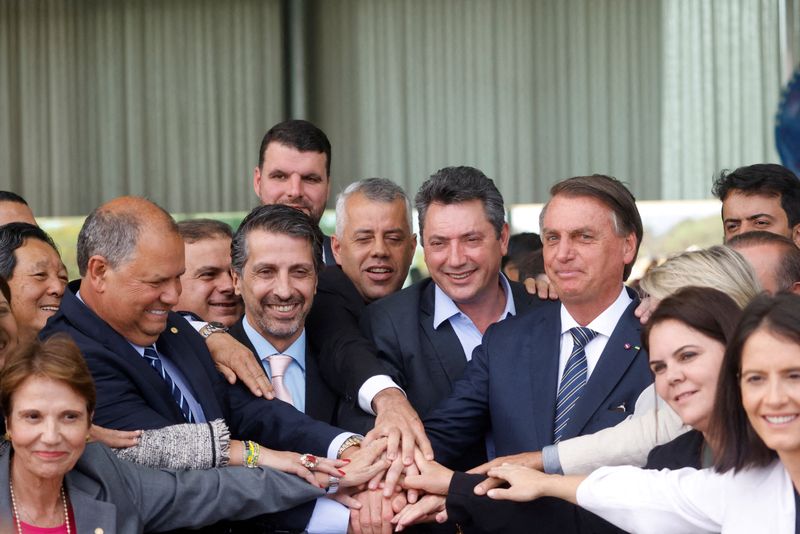By Nayara Figueiredo
SAO PAULO (Reuters) - Agribusiness leaders contributed the lion's share of financing for President Jair Bolsonaro's re-election campaign, underscoring his close ties with farm interests, while his leftist challenger relied almost exclusively on public party funding.
Individual donors contributed nearly 80% of Bolsonaro's campaign funds, and 33 of his 50 biggest donors had ties to agribusiness, according to a Reuters analysis of data from electoral authority TSE.
None of the major individual donors to Lula's campaign have clear agribusiness ties, underscoring his struggles to reconnect with the farm sector despite close ties during his 2003-2010 presidency and fresh entreaties this year.
Lula holds a narrow lead ahead of the Sunday runoff vote, according to the latest polls.
Bolsonaro's strength with farmers and ranchers comes down to several factors, from conservative social views that connect with rural Brazil to his advocacy for gun rights empowering land owners.
By contrast, Lula and his Workers Party (PT) have ties to the Landless Workers Movement (MST), which has challenged traditional property rights, stoking tensions with landowners.
Bolsonaro is a harsh critic of the MST and has also sided with farmers in land conflicts involving indigenous claims. As president he has halted the process of demarcating indigenous territory and loosened enforcement of environmental laws, which has also bolstered his popularity with some rural interests.
"The farm sector loves Bolsonaro beyond any doubt," said Nilson Leitao, a former lawmaker who heads the Instituto Pensar Agro (IPA), which advises the agricultural caucus in Congress.
Brazil's farm caucus boosted its numbers in Congress in this month's general election on a wave of conservative sentiment, and now expects to have a majority in both the upper and lower chamber.
At the top of the ranking of agribusiness donors is Hugo de Carvalho Ribeiro, who gave 1.2 million reais ($225,000) to Bolsonaro's campaign. His brother-in-law is former Agriculture Minister Blairo Maggi, known as "soy king" for his role in a family ag conglomerate.
All of Bolsonaro's other 32 farm sector donors contributed at least 200,000 reais each, the data showed.
Those and other individual donations made up about four-fifths of his campaign's war chest, totaling 96.5 million reais, according to the latest TSE data.
Brazil banned corporate campaign donations in 2016.
By comparison, about 97% of Lula's 126.8 million reais in campaign funds came from his party's public financing based on its number of representatives in the lower house of congress.
Bolsonaro is a newcomer to his right-wing Liberal Party (PL), a smaller party that focused more of its limited public funding on other races.

"Bolsonaro's candidacy is less dependent on party politics, it is less institutionalized," said Rafael Cortez, partner at Tendencias political risk consultancy.
Despite being spurned by major agricultural interests in the campaign, Cortez said he expects a Lula government would be pragmatic and open to negotiation, as the leftist was in his prior two terms, helped by booming commodity prices. However, budget constraints could make it harder for him to win over a strong coalition in Congress in a new term.